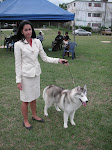Princess
Pablo at the beach
Animal Emotions
Animals got a bad
deal when they were put on earth without the ability to speak. We humans are a little better off because we
can easily transmit our thoughts and feelings to one another through speech. There are some people who think of animals as
dumb brutes and who go so far as to hold that animals have no souls, emotions,
spirits, or even self consciousness.
They think that animals are ours to use, however we like. If you buy into that idea it's easy to
justify the cruelty we apply to food animals, lab animals, and working
animals. After all, they say, animals
don't tell us they object to the cruel treatment we give them.
Anyone who ever
loved and lived with a dog or even a cat will deny such a blunt, mechanistic
view of animals. You can't have a dog for a pet and think he has no emotions,
self consciousness, etc. A dog will bond
for life with his master in a very short time.
Even though he can't tell me how he feels in words, I still know he has
a big range of emotions from observing his interaction with me. He shows it by his physical reactions to our
emotions like tail wagging, racing, bowing, licking, or even barking. He reads the emotions of our lives and shows
us his reactions. Be it anger, fear,
calmness, rush, sleep, love, he has a reaction tailored to our feelings. How could he understand and differentiate out
moods and actions and react to each one appropriately if he didn't have
emotions and self consciousness himself?
With a faint
stirring of her tail, my sweet little Princess responds to my recognition of
her. If I look like I want to pet her,
she comes to me, rolls over and presents her tummy for a scratching. I always
thought my dogs were better at reading my emotions and moods than most other
people are, even though I can speak to people about my feelings. Think about it—wouldn't you develop a keener
perception about others' feelings if you didn't have speech to help you?
At the top of
this posting is one of my favorite pictures of an animal. It's Pablo at the beach in Malibu. I've used this picture and Pablo's story
before, but this time I do it just to ask you a question. Is this dog angry, upset, sick, loveless? Or is he bursting with joy, loving life, and
at peace with his situation?
Those are easy
questions, so here's a tougher one: What is Pablo trying to say to Amanda, his
owner and the woman behind the camera?
Clearly he's telling us how great he's feeling and returning her
love. Keep in mind Pablo had a many
months-long bout with illness until he was healthy enough to be flown to the US
and his new home with Amanda. Chances
are in his entire life he never had a
moment of pure joy like the one the camera caught on California's most famous
beach.
You might notice
that when I refer to animals with relative pronouns, I do it with
"who," not "which," and when I use personal pronouns for
animals, Princess is "she, and Danny was "he." Stuffy grammarians say doing this is
"anthropomorphizing" (attributing human qualities to an animal) and
prescribe against it. But I emphatically
deny this is wrong. These companions are
emotional little beings who share their feelings with me and understand mine as
well.
Our penchant for
political correct language finally made "chairman" into
"chair" and "spokesman" into "spokesperson." I'm hoping it won't be too long until we
honor our animal companions with "he" or "she" instead of
the godless, cold, inert "which."
Les Inglis
Les Inglis
































































































No comments:
Post a Comment